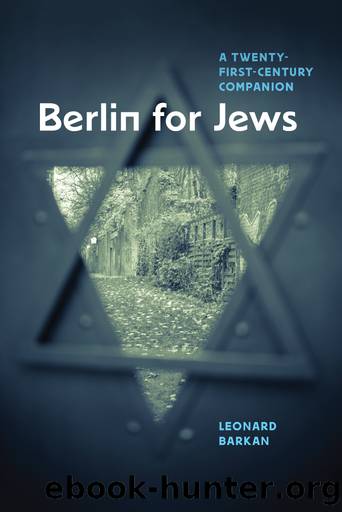Berlin for Jews by Leonard Barkan;

Author:Leonard Barkan; [Barkan, Leonard]
Language: eng
Format: epub
ISBN: 978-0-226-01083-0
Publisher: University of Chicago Press
Published: 2016-09-08T00:00:00+00:00
And:
I imagine that just as I was being thrust into this world a supernatural being plunged a dagger into my heart, with these words: âNow, have feeling, see the world as only a few see it, be great and noble; nor can I deprive you of restless, incessant thought. But with one reservation: be a Jewess!â And now my whole life is one long bleeding.
Hannah Arendt takes outcries like these pretty straight and uses them to nail down charges that Rahel was fatally deluded by the promises of the Enlightenment.
That may be true, but when we take a closer look, we see a more complex tangle of beliefs and desires. The letter about being âein Schlemihl und eine Jüdin,â written in 1793, is an answer to Rahelâs friend David Veit (a fellow Jew), who has recently been granted the privilege of visiting Goetheâa privilege not yet accorded to herâand it resonates with a sense of unentitlement, both on religious and gender grounds. It is also, however, steeped in an almost ostentatious mastery of Christian German culture. The quotation about the executionerâs axe is drawn from Goetheâs Egmont, near the moment of the heroâs death (itself a religious issue, since he is a Dutch Protestant being executed by Spanish Catholics). So Rahel has the text of Goetheâs (quite recently written) play at her fingertips, and she identifies with it. On the other hand, she identifies with it negatively, since in the original the executionerâs axe does gnaw on his heart. On the third hand, the very focus on this passageâwhich turns up elsewhere in her lettersâabout cutting and not cutting is bound to arise from some of the most basic issues of difference between Jews and Christians. On top of which, the very phrase âein Schlemihl und eine Jüdinâ depends on a piece of Biblical-origin Yiddish that had been quite thoroughly domesticated into German. Domesticated, that is, without ceasing to be Jewishâwhich makes the person Rahel and the word Schlemihl partners indeed. If this is Jewish self-hatred (a detestable phrase and, for me, most applicable to those who accuse others of it), it is also an expression of pride. The same goes for Rahelâs whole life as âone long bleeding.â Along with the dagger in the heart, the âsupernatural beingâ has bestowed upon her a golden array of âJewishâ traits: deep feeling, unique vision, continuous questioning, and a natural nobility that defies the worldâs petty categories of inherited social class.
Of course, all this philo-Judaism wrapped inside anti-Judaism as expressed by Rahel herself must come up against a far simpler and nastier account of the matter by those around her. However Rahel might strive either to escape from or redefine her identity, there were plenty who nailed her as a Jewess without any fancifying attributesâeven among those close to her. One could consider ambivalent the remark by Kleist that âJewish Society would be my favorite if the Jews did not act so pretentiously about their cultivation.â Itâs harder to discount Ludwig Tieckâs
Download
This site does not store any files on its server. We only index and link to content provided by other sites. Please contact the content providers to delete copyright contents if any and email us, we'll remove relevant links or contents immediately.
Spell It Out by David Crystal(35361)
Underground: A Human History of the Worlds Beneath Our Feet by Will Hunt(11275)
A Year in the Merde by Stephen Clarke(4670)
Venice by Jan Morris(2058)
Claridge's: The Cookbook by Nail Martyn & Erickson Meredith(1971)
My Paris Kitchen: Recipes and Stories by Lebovitz David(1895)
A TIME OF GIFTS by Patrick Leigh Fermor(1853)
The Plantagenets by Dan Jones(1623)
Welcome to the Goddamn Ice Cube by Blair Braverman(1608)
Bang Poland: How To Make Love With Polish Girls In Poland by Roosh V(1595)
Top 10 Prague (EYEWITNESS TOP 10 TRAVEL GUIDES) by DK(1572)
From Russia with Lunch by David Smiedt(1554)
The Finnish Way by Katja Pantzar(1540)
The Isle of Mull by Terry Marsh(1523)
A TIME TO KEEP SILENCE by Patrick Leigh Fermor(1502)
Rick Steves London 2018 by Rick Steves & Gene Openshaw(1498)
A Taste of Paris by David Downie(1496)
Merde in Europe by Stephen Clarke(1439)
Insight Guides Experience Tokyo by Insight Guides(1422)
